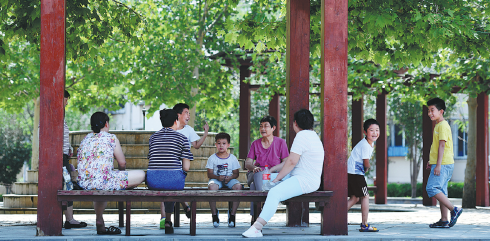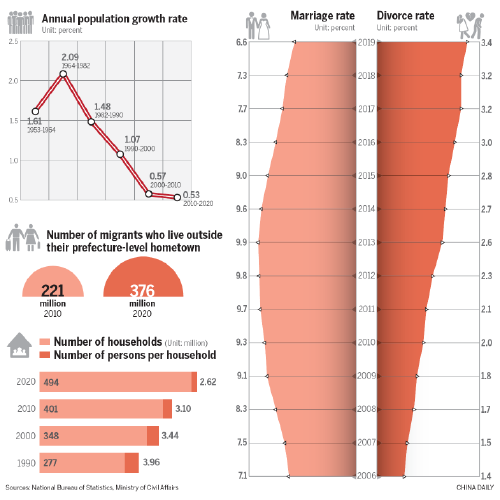SMALLER FAMILIES BECOMING THE NEW NORMAL
Various factors in play as record decline sees number fall below decades-old benchmark

China's household size has hit a record low and dipped below a benchmark, the seventh national census showed, as the country navigates a fast-shifting demography.
According to the census, there are 2.62 members per family, down from 3.1 a decade ago.
The figure has dipped below the "three-person-family" benchmark-which the government had promoted between 1980 and 2015 when stricter family planning policy was in place.
Experts said a rising number of childless, single-parent and one-person families have weighed down the number, but insisted that there's no need to overreact.
"I was a bit surprised by the new figure," said Zhuang Ya'er, a researcher with the China Population and Development Research Center, who tracks family size data.
"It is well below three and rather close to the level in developed economies," she added.
The figure had fluctuated slightly above three over the past decade, except in 2014 when it briefly fell to 2.97 only to return above three the next year.
The authorities started tracking the figure since the first national census, rolled out four years after the People's Republic of China was founded in 1949.
The 1953 survey found that the average size of a household was 4.33 in the then largely rural nation.
The number fluctuated between four and 4.5 for decades, until it sank below four in the 1990 census-a decade after the introduction of family planning policy-and trended downward in all of the following surveys.
China's family size is relatively small by global standards, said Zhang Jing, a Beijing-based researcher on family development.
A mixture of factors are behind this, ranging from policymaking to economic growth to more migrants, she added.
Data from the United Nations showed that family size ranges from two to nine persons globally. Smaller families are commonly found in wealthier regions such as Europe and North America, rather than in developing countries.
Shortly after the census data was released early last month, Ning Jizhe, director of the National Bureau of Statistics, offered an explanation.
He told a news conference in Beijing that increased migration and improved housing were among the major contributors.
"The young move out when married," he said, adding that the flagging fertility rate and more divorcees have also advanced the "miniaturization" of Chinese families.
The NBS data showed that the per capita residential area for urban and rural residents reached 39 and 47 square meters in 2018, up from 32 and 39 square meters from 1978, respectively.
Yang Yifan, a demographer in Chengdu, Sichuan province, said China's recent economic boom, its world-class digital infrastructure and its unique parent-child bonding have together made moving out a preferred choice, and increasingly a social norm.
On one hand, better educated Chinese seek independence by living apart from older generations due to diverging habits and values, and on the other, they have maintained rather close ties through frequent video calls or mutual visits made possible by the sprawling high-speed railway network, he said.
"It is a parental obligation in China to help children buy homes with their lifelong savings," said Yang, deputy head of the National Interdisciplinary Institute on Aging at Southwest Jiaotong University.
"That has made it financially possible to create new and smaller families."
Urbanization
The shrinking family size has dovetailed with slowing population growth. China's population grew by an annual average of 0.53 percent over the past decade, down from 0.57 percent in the previous 10-year period, NBS data showed.
To shore up the number of newborns, the authorities started to allow all couples to have a second child in 2016, and a third last month.
However, Zhuang from the China Population and Development Research Center said there's no need to overreact to the shrinking family size, as the data are susceptible to a wide range of factors other than the birthrate. Some, such as migration, are signs of greater economic vibrancy.
The latest census data showed about 376 million, or one in every four, people in the Chinese mainland are classified as migrants living outside their native prefecture-level hometown, up 70 percent from a decade ago.
Migrants, a phenomenon that emerged after China embraced market-oriented reforms in 1978, usually move from the less affluent rural regions to more expensive places, seeking better-paid jobs and permanent residency.
For decades, the less-skilled worked at construction sites, manned assembly lines in coastal factories and served dishes in downtown areas, playing their roles in the nation's urbanization and economic growth.
The younger have taken up casual jobs, such as food delivery, car-hailing and other app-based business operations, which underpins the rapid expansion of the gig-economy.
However, the hukou, or household registration system, in many locations still hinders out-of-towners from completely merging into the social structure in their residency area, making it financially unpopular to bring families along.
Xiang Yufang, a tutor in Chongqing, is among many college-educated migrants who have acquired a local hukou to buy homes in their adopted city, even when single.
The 24-year-old, whose hometown is about a four-hour bullet train trip from Chongqing, said many out-of-town graduates that she knew of did the same, giving rise to the so-called one-person families.
"I just think I need a home of my own," she said, adding people of her age no longer treat buying homes as part of preparations for marriage.
Yang, the demographer, said stronger financial standing has allowed many, especially women, to have more say over their marital and childbearing status. "They can decide when to marry, or whether to marry at all."
Keeping single
Wang Qingli, who teaches English at a primary school in Shenzhen, Guangdong province, is among a growing number of young, educated women who opt not to have children.
"Having a child is too costly an option," said the 28-year-old, who moved to the city near Hong Kong after getting her master's degree from a college in Beijing.
She is a longtime advocate of the "FIRE", or financially-independent-retire-early, lifestyle, which requires practitioners to minimize living costs so that they can save up enough to sustain their "low-desire" living after an early retirement.
Wang has over time talked her boyfriend, an architect, into accepting a childless, or DINK marriage, an acronym for double-income-no-kid.
"As China gets richer, we young people today are thinking more about whether we want to get married or have a child, or whether it is necessary, rather than following suit," she said.
China has had more than 600,000 DINK couples in 2004, according to an estimate by the All-China Women's Federation, the latest available figure endorsed by authorities.
A more recent survey conducted by Zhuang and her colleagues showed that among about 60,000 women polled across China, about 4 percent said they were open to the DINK lifestyle.
Reared in an impoverished county in Hubei province, Wang Qingli said she used to even be pessimistic about marriage as most couples in her hometown had formed unions of "interest"-rather than love-to fend off risks.
"Women of my mother and grandmother's generations won't divorce even if they are unhappy," she said," as they are less educated and therefore more financially dependent".
In 2017, more than 52 percent of students enrolled in undergraduate programs and vocational colleges were female, central government data showed. That is about 28 percentage points higher than in 1978. In 2017, more than 48 percent of graduate students were female, almost 30 percentage points higher than in 1985.
Meanwhile, the divorce rate has risen from about 1.85 divorces in every 1,000 people in 2009 to 3.36 in 2019.
Lila, a videoblogger in Shanghai who in January posted a videoclip about the older generations' disapproval about the DINK lifestyle on the microblogging service Sina Weibo, which has got more than 610,000 views and hundreds of comments, said she respects young couples who wish to have children.
However, workplace gender discrimination, body-shaming, and the prolonged pregnancy process have made her hesitant.
"Pregnancy has a much bigger impact on women than men," said Lila, who has more than 1.3 million followers on Weibo and asked to be identified by her alias.
The DINK lifestyle's rising appeal has signified a fundamental shift in young people's attitudes toward offspring-traditionally the caregiver when parents get old-with better social security programs and more commercial insurance options.
Lila said she had thought about crowdfunding a villa in the countryside when old and seeking company from like-minded DINK couples.
"Even if I have a child, I hope him or her lives a more splendid life, instead of toiling as a caregiver," she said.
Yang Xiao, an internet worker in Shenzhen and an advocate for the lifestyle, said he does not expect that having children can make old age more secure. "Though children are obligated to care for their parents, there are no rules over how far they go," said the 24-year-old.
Yang added there's also the prospect that children die before parents, or be financially strapped and scramble to offer even survival-level support.
Zhang Jing, the family development expert, said the DINK couple is just one of many family patterns that have emerged over the recent decades with smaller sizes.
Sun Fengyi and Xu Xiaowen contributed to this story.




Today's Top News
- China to continue anti-dumping duties on EPDM imports
- Trump says war with Venezuela remains possible -- NBC News
- China urges Japan to stop challenging intl bottom line with its nuclear ambitions
- US arms sales to Taiwan a dangerous gambit: Editorial flash
- Taiwan opposition lawmakers announce plan to impeach Lai Ching-te
- Boosting consumption will be key in 2026






























